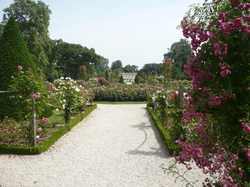Cultures - timeline starting point

Approaching the notion of human culture from a timeline starting point is no less fascinating. Different lifestyles linked to hunting and gathering under different climatic conditions, when human society was nomadic and existed in small, mobile communities, was the earliest basic form of life. As agricultural discoveries and technology developed, human communities gathered, settled and expanded around agriculturally fertile areas. Tribes and clans developed and waged wars over access to natural resources. Fiefs became kingdoms. Kingdoms became nations and states. Technological development expanded human capacities, leading to industrialization, and - later on - cultures based on electronic processing of information ("The Information Society").
The essence of the timeline starting point is to choose any given area in the world and look at how that area's culture has developed over time. It is of course up to you to decide how long you wish that timeline to be. You can start with the time at which the earliest signs of human life in that area manifested themselves and move up to the present time, or - alternatively - choose any given limited time span which interests you. If you wish to study how a new type of technology has changed the culture in that area, you will of course choose a time span related to when that technology was operative. If you wish to see how changes in demography have influenced the culture in that area, you will need a time span that allows you to see actual changes in demography at work. The options for teasing your curiosity are infinite.
Moving back in history there are of course numerous subjects of interest. What was the Viking culture like? How did the Vikings live? What were the causes of their expansive behavior and why did they disappear so quickly from the world scene? Who were the Etruscans? Where did they come from? What do we know about their form of life? What happened to Etruscan culture after they were conquered by the Romans? The Mayas have left us numerous impressive monuments. What kind of society managed to create all these monuments, and why did they do it? What happened when the Maya culture was extinguished? How did that come about? Tons of literature has been written about the rise and fall of the Roman empire, but this subject still contains many lessons we can learn from in dealing with our present. In our present world we are confronted with vast cultural transformations due to the enormous impact of communication technology and the internet. The whole world is deeply affected, and groups that earlier were incapable of attracting attention are now able to organize themselves and attract followers around the world. This may give them a critical mass and sufficient strength to influence evolution in many areas, even though their numbers are insignificant at each locality. These are examples of interesting subjects, and we could go on indefinitely in listing more subjects.
The essence of the timeline starting point is to choose any given area in the world and look at how that area's culture has developed over time. It is of course up to you to decide how long you wish that timeline to be. You can start with the time at which the earliest signs of human life in that area manifested themselves and move up to the present time, or - alternatively - choose any given limited time span which interests you. If you wish to study how a new type of technology has changed the culture in that area, you will of course choose a time span related to when that technology was operative. If you wish to see how changes in demography have influenced the culture in that area, you will need a time span that allows you to see actual changes in demography at work. The options for teasing your curiosity are infinite.
Moving back in history there are of course numerous subjects of interest. What was the Viking culture like? How did the Vikings live? What were the causes of their expansive behavior and why did they disappear so quickly from the world scene? Who were the Etruscans? Where did they come from? What do we know about their form of life? What happened to Etruscan culture after they were conquered by the Romans? The Mayas have left us numerous impressive monuments. What kind of society managed to create all these monuments, and why did they do it? What happened when the Maya culture was extinguished? How did that come about? Tons of literature has been written about the rise and fall of the Roman empire, but this subject still contains many lessons we can learn from in dealing with our present. In our present world we are confronted with vast cultural transformations due to the enormous impact of communication technology and the internet. The whole world is deeply affected, and groups that earlier were incapable of attracting attention are now able to organize themselves and attract followers around the world. This may give them a critical mass and sufficient strength to influence evolution in many areas, even though their numbers are insignificant at each locality. These are examples of interesting subjects, and we could go on indefinitely in listing more subjects.